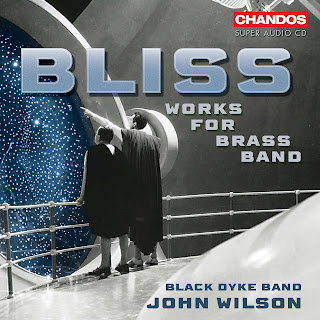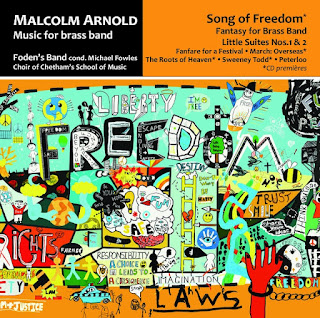Arthur Bliss: Works for Brass Band; Black Dyke Band, John Wilson; Chandos
Malcolm Arnold: Music for Brass Band; Foden’s Band, Choir of Chetham’s School of Music, Michael Fowles; Beckus
Reviewed 24 August 2024
Two discs focussing on 20th century composers whose works for brass band are performed alongside arrangements to create two brilliant and highly satisfying portraits
Brass bands emerged in the UK in the mid-19th century as a popular pastime, the result of a combination of circumstances, industrialisation, which produced a large working class population, technological advances in instrument design, and the mass production to manufacture and distribute the instruments. It can be argued that bands were an expression of solidarity by growing communities, but the association of brass bands with industrial concerns often arose because they were seen as a way to keep workers from organising in radical groups. The first British open brass band championships took place in Manchester in 1853, and competition remains a strong feature of brass banding. Moving into the 20th-century, the movement developed sufficient confidence that well-known, non-specialist, composers would be approached for pieces, particularly for competitions.
Two recent discs illuminate the way 20th century British composers have interacted with brass bands.
On Chandos, John Wilson conducts the Black Dyke Band in music by Sir Arthur Bliss, his two brass band works, Kenilworth and The Belmont Variations, along with arrangements of music from Adam Zero, Checkmate, and Things to Come. The Black Dyke Band traces its history continuously from 1855 when it formed as the band of the Black Dyke Mills in Queensbury, Bradford, West Yorkshire, England, a company owned by John Foster.
On the Malcolm Arnold Society’s Beckus label, Michael Fowles conducts Foden’s Band in music by Malcolm Arnold, his brass band works, Fantasy for Brass Band, Song of Freedom, and Litte Suites Nos. 1 & 2, plus arrangements of his Peterloo: Overture, suite from Sweeney Todd, The Roots of Heaven: Overture and March: Overseas. Foden’s Band traces its origins back to 1900 when the village of Elworth, near Sandbach in Cheshire, formed its own band, and from that base local industrialist Edwin Foden formed the Fodens Motor Works Band.
Sir Arthur Bliss’ engagement with brass bands dates from 1935 when, whilst writing an article about musical activity in the country, he visited four Lancashire towns and attended a brass band rehearsal. Impressed with the players’ virtuosity, he agreed to write Kenilworth for the National Brass Band Champtionships in 1936 when he conducted the premiere at the competition’s final in Crystal Palace. He returned to the genre in 1962 when he composed The Belmont Variations for the National Brass Band Champtionshipsin 1937, though in this case the work was scored by Frank Wright, a well-known figure in brass banding.
Kenilworth showcases the side of Bliss that came out in his role as Master of the Queen’s Music, and it is this element, perhaps, which has persuaded arrangers to tackle other works. ‘At the Castle Gates’ combines pomp and grandeur with more thoughtful moments, whilst ‘Serenade on the Lake’ successfully showcases the band’s more lyrical side. But then we end with a very Waltonian march, or perhaps both the younger composers channelling that side of Elgar.
The other work on the Bliss disc written specifically for band is The Belmont Variations, this is Bliss some 25 years later and working explicitly with a brass band specialist. The theme is intriguing, lacking bombast and showing the more sophisticated side of a brass band, then follow six variations in a variety of genres from the wonderfully throw away ‘lightly and staccato’ through a bluesy ‘Slow and expressive’ to a delightful waltz, a brilliant movement that rather harks back, and return to the quietly lyrical, before the rousing finale in Polonaise rhythm.
The rest of the disc is given over to arrangements, but you have to admit that Bliss’ music fits the band so well that these rarely sound like arrangements, and it is good to have new versions of suites from Adam Zero and Things to Come, along with the lesser known Music from ‘The Royal Palaces’. This latter brings out all of Bliss’ armoury of devices from the pomp to the intimate to create descriptive moments in royal palaces originally written for a TV series. The disc ends with Eric Ball’s arrangement of Four Dances from ‘Checkmate’. Ball’s arrangement has become a classic in its own right, made in 1978 for the National Brass Band Championships. Under John Wilson’s deft eye, the band plays brilliantly, and the thing about the programme is that it makes a highly satisfying recital, showcasing Bliss’ undoubted talent and never once hinting that the much of the music came from somewhere else.
Whilst brass instruments were central to young Malcolm Arnold’s life (he acquired his first trumpet whilst still in short trousers), he many only have occasionally played in chapel bands, though there were brass bands in and around Northampton where he grew up. He played the trumpet professionally, in the London Philharmonic Orchestra, from 1941 to 1948, when he dropped it to concentrate on composing.
So, it comes as a bit of a surprise that his first work for brass band, the Litte Suite No. 1 wasn’t written until 1963. It was written for the National Youth Brass Band of Scotland, a commission from the Scottish Amateur Music Association. A short piece, only seven minutes long, it is very much designed for the young performers. The Prelude combines a sort of slow fanfare with a perky march, then the Siciliano features a lovely lyrical theme and the work ends with a brisk yet appealing Rondo.
The Little Suite No. 2 from 1967 was closely modelled on the earlier one, this time written for the Cornwall Youth Brass Band. In three contrasting movements, a direct and enjoyable catchy Round, then a lyrical yet evocative Cavatina and finally the vividly fast and furious Galop.
The Song of freedom from 1972 was a commission from the National Schools Brass Band Association, it was for brass band and children’s choir and had to be suitable for school bands and choirs! The four movements set poems written by children, selected via a competition. The Prelude is sober, yet lyrical and we begin to realise that there is an earnestness to the selection of words. Arnold’s response in all the movements is simple and direct, though I thought there might be the odd infelicity in the word setting. The Hymn proves to be a stirring march, whilst the Intermezzo turns things dark and thoughtful, then the Postlude is suitably stirring.
Finally his 1974 Fantasy for brass band gave Arnold the chance to write a test piece for adult performers, this was written for the National Brass Band Championships. It is not a deliberately showy work, the challenge come from making emotional sense of Arnold’s subtle writing. Lasting nearly ten minutes, there are five sections that play continuously. But turns upbeat and lyrical, this is sophisticated writing with emotional depth that reminds us of the Arnold of the symphonies rather than the perky marches.
The disc is completed by a group of arrangements of occasional pieces, the brightly attractive Fanfare for a Festival (1955), March: Overseas (1960) which is a classic Malcolm Arnold March and the interestingly complex The Roots of Heaven: Overture (1967). The disc ends with two arrangements of Arnold’s orchestral writing. His ballet Sweeney Todd is still something of a rarity. Written in 1959, a concert suite was produced with the collaboration of the composer and in 2006 this was arranged for brass band. Here was have Arnold writing in rather dark, symphonic mode which translates well to brass band alongside the livelier popular side.
Better known, by half, is Arnold’s Peterloo Overture, written for the centenary of the first meeting of the Trades Union Congress and here heard in a 2002 arrangement for brass band. Here we get Arnold the brilliant writer of marches but also the complexity of the subject matter and you feel a degree of politcal engagement.
Foden’s Band are here conducted by their musical director, Michael Fowles, and they are on top form, clearly relishing what challenges Arnold brings as well as bringing out the sheer enjoyment of his music. For Song of Freedom they are joined by the Choir of Chetham’s School of Music (choir director, Marcus Farnsworth).
Both of these discs have come about partly through special interest groups, the Bliss disc has the support of The Bliss Trust and The Arthur Bliss Society, whilst the Arnold disc is supported by the Malcolm Arnold Society, but both discs are well worth listening to and far from special interest.
Arthur Bliss (1891-1975), arr. Michael Halstenson (born 1956) – Welcome the Queen (1954/2023)
Arthur Bliss – Kenilworth: Suite for Brass (1936)
Arthur Bliss, arr. Robert Childs (born 1957) – Suite from Adam Zero (1946/2023)
Arthur Bliss, arr. Philip Littlemore (born 1967) – Suite from Things to Come (1934-35/2016)
Arthur Bliss, arr. Frank Wright – The Belmont Variations (1962)
Arthur Bliss, arr. Michael Halstenson – Music from The Royal Palaces (1966/2023)
Arthur Bliss, arr. Eric Ball (1903-1989) – Four Dances from Checkmate (1937/1978)
Black Dyke Band
John Wilson
Recorded Dewsbury Town Hall, 16 & 17 March 2024
CHANDOS CHSA 5344 1CD [69:51]
Malcolm Arnold (1921-2006), arr. Philip Sparke – Fanfare for a Festival (1955/1986)
Malcolm Arnold, arr. Neil Richmond – March:’Overseas’ (1960/2008)
Malcolm Arnold, arr. Neil Richmond – The Roots of Heaven (1958/2002)
Malcolm Arnold – Little Suite No. 2 for Brass Band (1967)
Malcolm Arnold – Fantasy for Brass Band (1973)
Malcolm Arnold – Song of Freedom (1972)
Malcolm Arnold – Little Suite No. 1 for Brass Band (1963)
Malcolm Arnold, arr. Philip Littlemore – Suite from Sweeney Todd: Ballet (1959/2006)
Malcolm Arnold, arr. Andrew Duncan – Peterloo: Overture (1967/2006)
Foden’s Band
Choi of Chetham’s School of Music
Michael Fowles
Recorded Sandach School, Cheshire, 16 & 17 March 2024, Stoller Hall, Manchester, 27 April 2024
Beckus MAF003 1CD [72.14]
The blog is free, but I’d be delighted if you were to show your appreciation by buying me a coffee.
Elsewhere on this blog
- Into the unknown: soprano Aoife Miskelly makes her debut with Vache Baroque in Pergolesi’s rarely performed opera, L’Olimpiade – interview
- Responses to Thomas Hardy: composer
Arthur Keegan’s complex web of music new and old, atmospherically
performed by Lotte Betts-Dean, James Girling & Ligeti Quartet – record review - Prom 40: Transcending limitations, Bach’s St John Passion from Masaaki Suzuki and Bach Collegium Japan – concert review
- Prom 37: intense contrasts thundering cannonades to personal intimacy, Antonio Pappano conducts Britten’s War Requiem – concert review
- Music is the best argument for its continued existence: John Largess of one of the USA’s most celebrated quartets, the Miró Quartet – interview
- More Buffy the Vampire Slayer than German Romanticism: Gothic Opera’s Der Vampyr at the Grimeborn Festival – opera review
- Substantial and satisfying listening: Stuart Hancock’s score for the new film, Kensuke’s Kingdom – record review
- White-hot dramatic impetus: Meyerbeer’s Le prophète on LSO Live uses a traditional version but captures the work’s essential drama – record review
- Songs from two golden ages: Nicholas Mulroy, Elizabeth Kenny & Toby Carr in a recital of effortless beauty – record review
- Everything is connected: Barbican Quartet on their debut album, Manifesto on Love, on Genuin label – interview
- Vivacity, humour & pathos: Opera Holland Park & Charles Court Opera in Gilbert & Sullivan’s The Yeomen of the Guard – opera review
- Prom 24: Vividness & virtuosity in an astonishing danced staging of Purcell’s The Fairy Queen – opera review
- Home









